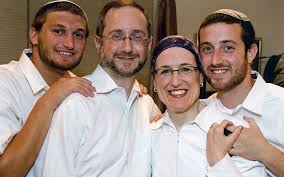
About 17 years ago, we prepared
to bid farewell to our eldest son, Avi, as he departed for his post-high school
year in Israel. Little did we know that this gap year would turn into a life in
the Holy Land. I have to confess that I was warned: “You spent three years in
Israel after high school,” he cleverly argued, “so I get at least three
years!”
Negotiations were unnecessary. My wife and I were happy to let him
stay as long as he liked, and we’re even more elated that he and his family
have made their lives here.
These were the days before phones had decent cameras, so as the
date of his departure drew closer, I asked a photographer friend to come to the
house and take a family photo shoot.
With a wry smile on his face, Avi said, “I get it. We’re doing
this so you’ll have pictures of me, in case anything happens.”
I was shocked. I don’t think that morbid idea was even in the back
of my mind, let alone anywhere near my frontal lobe.
Off he went to Israel, followed a couple of years later by his
baby brother, Arky. Both of them, as I like to put it, “forgot” to come back to
the USA. Both spent a number of years in yeshiva and then did their service in
the IDF.
Countless family photos have been taken since then, and, thank
G-d, the number of people in the photos has increased, as wonderful wives and
adorable children have quite literally entered the picture.
* * *
My father, Shalom Staiman, a”h,
grew up in small town America, where the custom of blessing one’s children on
Friday night was unknown. Once it became part of his routine during his years
as a father, grandfather, and great-grandfather, granting brachot to others became a bigger and bigger avocation over time. By the
time he was in his 80s, his register of erev
Shabbat calls had blossomed exponentially, to the point where it so
monopolized his Fridays that he had to begin making these verbal visitations on
Thursday.
My father’s weekly
connections with people, usually by phone, but also in person for those nearby,
were multifaceted. There was the religious component, of course. But there was
much more. The calls were bonding social connections. They were counseling
sessions. They were shots in the arm. And they were not limited to the
immediate family. Distant relatives, who were long-detached from religion,
would eagerly anticipate their weekly blessing and the strengthening of
sometimes-dormant family ties that spanned most of a century. Troubled friends
and relatives lapped up the opportunity to glean strength and direction from my
father’s always-understated, always-on-point accumulated wisdom.
Rabbis
and rebbetzins from around the world, who had crossed paths with my
parents over the many years, would faithfully call in for their brachot. My father was not a rabbi, nor was he Chasidic, but people
valued his blessings because he was a man of modesty, honesty, quiet
leadership, and insight.
No one ever hung up
the phone disappointed.
* * *
While I have not successfully continued my father’s tradition in a
sustained manner, within the family I do try to bless my children and
grandchildren at least every few weeks, especially now that Chana and I also
live in Israel. During the war, it is certainly with increased meaning and
emotion that I invoke the verses of the bracha as my sons leave for
their reserve duty.
This morning, following a three-month break in his service, Arky
was once again clad in his IDF greens, rifle slung behind his back, heading
down south for the next phase of his duties. Those duties are sometimes
performed in the line of enemy fire.
He made a detour to our neighborhood, so I could say goodbye. I
kissed him and, of course, I blessed him. I recited the traditional verses,
which conclude with a prayer for peace. And while sometimes those words might
be rattled off, this time they were very deeply, consciously, profoundly meant.
Then we took the obligatory selfies.
As we did so, like an unwelcome visitor, his older brother Avi’s
quote from all those years ago insidiously crept into my head. “We’re doing
this so you’ll have pictures of me, in case anything happens.”
In a time of war, those words sit way too close to the fronts of
our minds. Hashem, please make them
go away.
Here’s praying that this morning’s selfie is just another family
photo, among many more to come in the future. A future of peace.
Jeremy Staiman and his wife Chana made aliya from Baltimore, MD in 2010
to Ramat Beit Shemesh. A graphic designer by trade, Jeremy is a music lover,
and produces music on a regular basis – one album every 40 years. He likes to
spend time with his kids and grandkids slightly more often than that.
I blessed
him
I kissed
him






